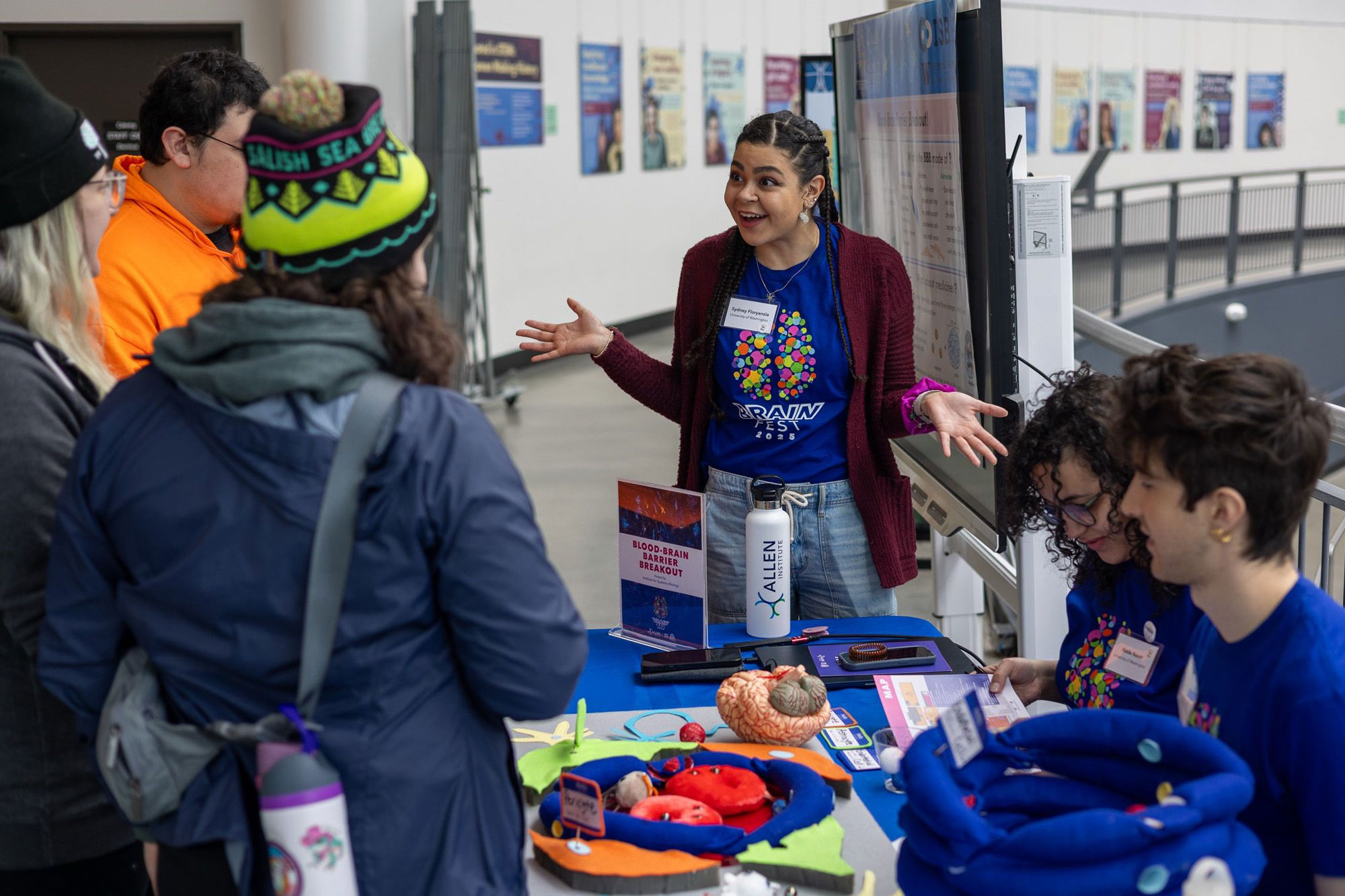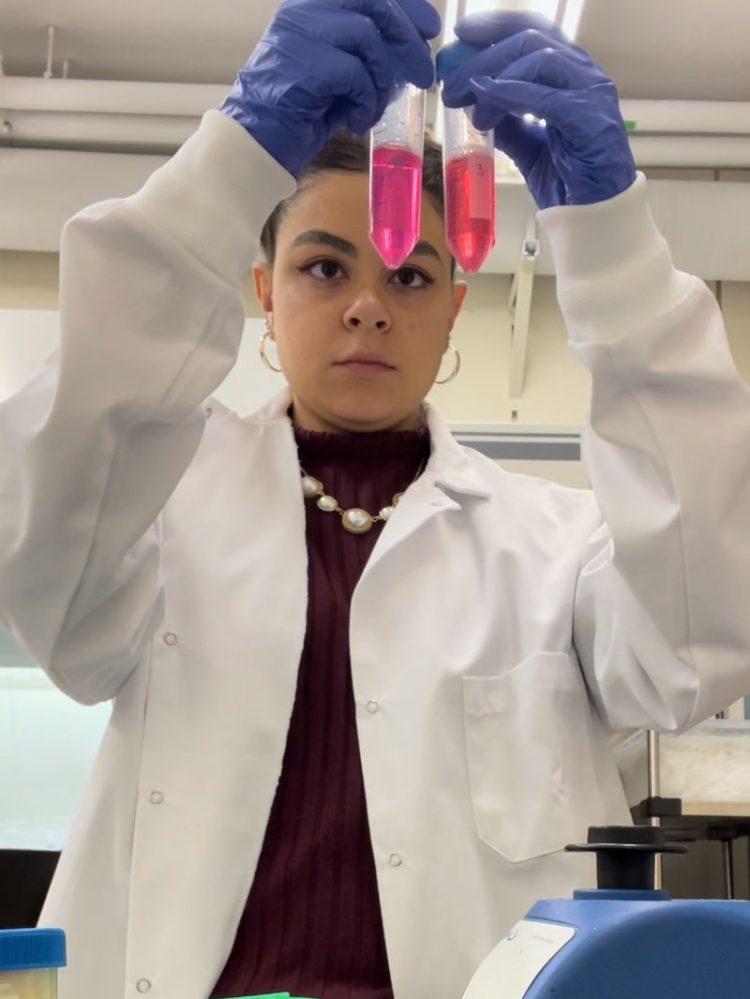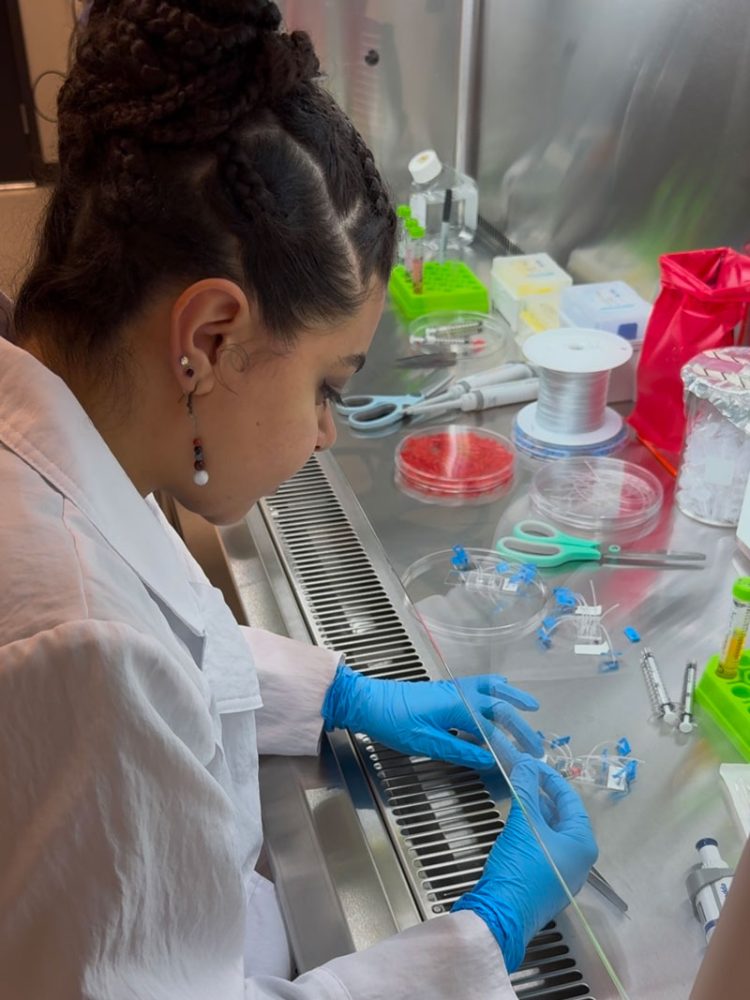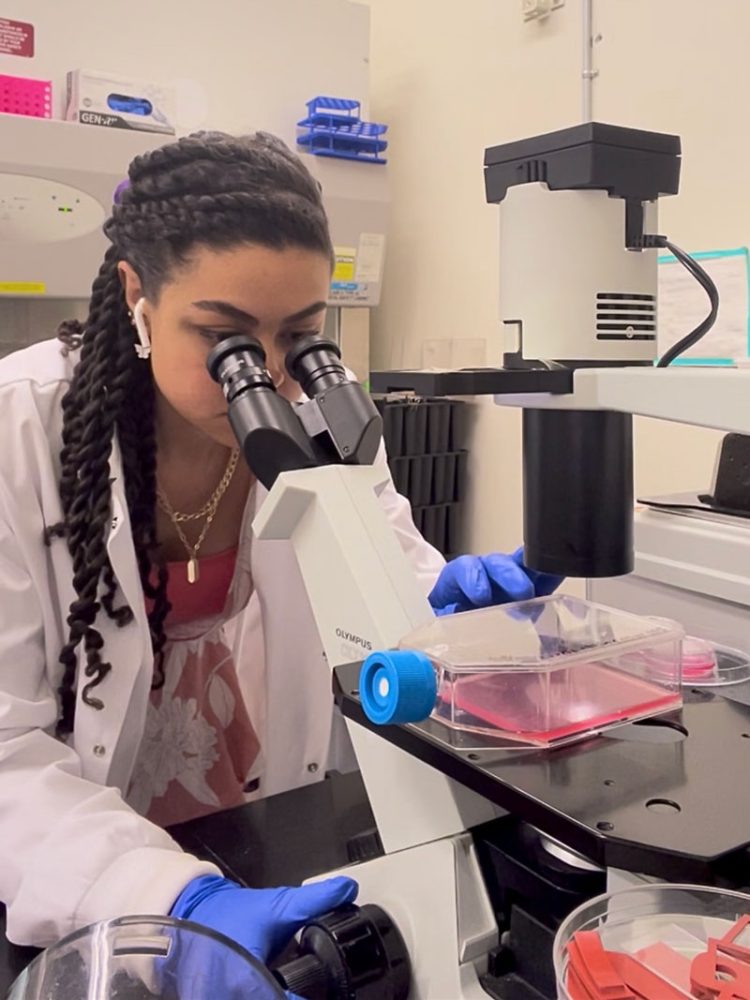
Discovery at the edge Discovery at the edge Discovery at the edge
At a time of shrinking federal support, the Graduate School is working to help students survive the storm.
By Hannelore Sudermann | Viewpoint Magazine
In a bustling lab at the University of Washington, Ph.D. candidate Sydney Floryanzia is working on one of the most complex challenges in biomedical science: how to model the human brain’s defenses—particularly the blood-brain barrier—and use those insights to treat neurological disease.
Now several years into her chemical engineering Ph.D. in Associate Professor Elizabeth Nance’s lab, Floryanzia is developing a protocol for isolating and cultivating neurovascular cells. The biological cultures she’s developing enable studies of drug delivery and how brain cells that regulate blood flow respond to pathological stimuli.
“We’re looking at and understanding the blood-brain-barrier and the landscape of the brain and disease so we can better inform drug-delivery strategies for things like neurological conditions or brain cancer,” she says.
But Floryanzia’s research—and that of many of her peers across campus and across the country—is under threat.
- Sydney Floryanzia earned her master’s in chemical engineering from the UW in 2023 and is now a Ph.D. candidate.
- Floryanzia works in the Nance Lab with Dr. Elizabeth Nance, studying neurological conditions.
- Because of delayed or freezed funds from federal grant sources, Floryanzia and her colleagues face an uncertain future.
The Nance Lab relies, in part, on federal funding from agencies including the National Institutes of Health, the National Science Foundation and the Department of Defense. As those funding sources become increasingly uncertain or delayed due to political shifts and budgetary standoffs, university labs are feeling the effects.
The impacts include hiring freezes for undergraduates and high school interns, paused collaborations with visiting scientists, less funding for graduate students and an atmosphere of scientific uncertainty.
“Our doctoral students are doing such amazing research,” says Joy Williamson-Lott, a historian and dean of the UW Graduate School. “And we know how important funding is for grad students choosing an academic program.”
For work as complex as blood-brain barrier research, which involves engineering, medicine and neuroscience, the stakes are especially high. Floryanzia’s efforts advance basic science and provide a foundation for future research in brain diseases like Alzheimer’s, Parkinson’s and multiple sclerosis.
Because of the financial uncertainty and the shrinking of research programs, today’s students are being dubbed by The Chronicle of Higher Education as a “lost generation” of young scientists and academics whose training and career trajectories have been derailed by the erosion of federal support.
Some are delaying graduation. Others are leaving academia altogether, seeking more stable jobs in industry or overseas. Still others can’t even begin their studies due to financial insecurity.
Williamson-Lott’s expertise is in the history of American education. “There has been nothing like this in the past,” she says, particularly the rollback of federal support.
She contrasts the current moment to the post-Sputnik era of the late 1950s when the U.S. dramatically increased funding for science and higher education to stay competitive on the global stage. Back then, she says, research was seen as a public good with clear benefits for economic growth, national security and international standing.
That vision is now under attack, she says. Last fall, well before cuts were announced, the UW launched a Research Resilience Fund for Ph.D. students, who are the most vulnerable to grant disruptions. “When a grant is canceled, we want to make sure that student doesn’t have to drop out and that research doesn’t have to stop,” says Williamson-Lott.
The goal is twofold: to keep current students from falling through the cracks and to ensure that graduate education remains accessible to students from all backgrounds—regardless of financial circumstance, she says.
“How do we focus on breast cancer if you can't say 'women'? How do we study sickle cell anemia if we can't say 'Black people'? How do we address bullying without talking about transgender youth?”
Joy Williamson-Lott, Dean of the Graduate School
“Higher education is where innovation and discovery happen,” Williamson-Lott says. “And graduate students play an essential role in it. It’s not just a private good. It’s a public good.”
Unfortunately, today the conversation around research funding is increasingly politicized. Topics such as gender, race and LGBTQ+ identities are being scrutinized in grant language, threatening the ability of scientists to even name the problems they’re trying to solve. For example, “barrier” is one of those words, and the blood-brain barrier is the focus of Floryanzia’s work.
“And how do we focus on breast cancer if you can’t say, ‘women’?” Williamson-Lott says. “How do we study sickle cell anemia if we can’t say ‘Black people’? How do we address bullying without talking about transgender youth?”
It’s a tough time for all of higher education, she says. “I am so glad to be at the University of Washington right now. We can weather this storm.” She credits those at the University as well as the community around it. “Washington is home to a broad network of allies who understand how higher education and the UW improve the local economy and our quality of life.”
Nonetheless, Floryanzia feels compelled to step out of the lab to communicate about her work in the hopes of building trust with the general public and combatting misinformation. As a volunteer with Stand Up for Science, a nonprofit that mobilizes researchers to advocate for science, she attended a rally at the Seattle waterfront in May. A passerby approached her and said he supported defunding the “fat cats in Washington, D.C.” He was surprised when she responded that the cuts were threatening research at the UW, she says.
“At first, I thought he didn’t believe science was important,” Floryanzia says. “But as we talked, it became clear he valued scientific research but didn’t think that the money in the capital supported scientists like me in his own community.
“It was brave of him to engage and share his views,” Floryanzia says. “And once we talked, I think both of our perspectives were changed.”


